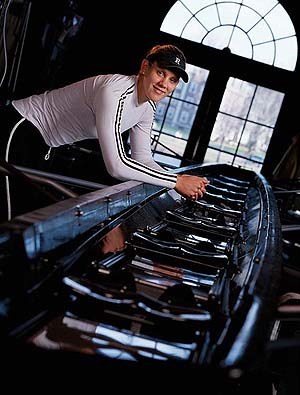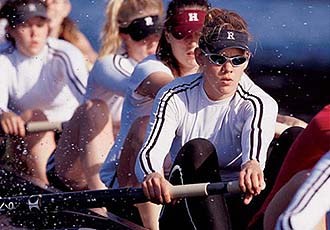Davies (her first name is pronounced car-in) rows in the number-six seat of an eight that coach Liz O'Leary has compared to a freight train for its steady, powerful base cadence. "It takes us a while to get up to speed," Davies notes. "We never have a fast start. But once we get going, we just motor along."
 |
| Caryn Davies leans on the gunwale of a shell at Weld Boathouse. |
| Photograph by Jim Harrison |
They sizzled in the season's first race, which pitted thirteenth-ranked Radcliffe against Princeton, then third in the nation. The Black and White had not beaten Princeton since 1989, and after 30 strokes they were already a boat length behind. But Radcliffe settled nicely into its cadence and, around the 750-meter mark, coxswain Julie Gluck '05 announced, "Here comes the freight train." Davies recalls, "We started walking back through them, and pulled even just before 1000 meters [the halfway point]. I thought, 'They're done; we're going faster than they are.'" Radcliffe stunned the Tigers, finishing 2.7 seconds ahead and thus declared themselves one of the nation's best crews. Eventually they went 10-1 on the season; in dual races, only Brown would outrace them, in late April. But three weeks after that loss, Radcliffe exacted their revenge at the Eastern Sprints, again rowing through Princeton, leaving the Tigers 4.4 seconds behind at the end; top-seeded Brown was a distant third, 7.4 seconds back.
The "engine room" (seats three through six in the center of the boat, where the biggest, most powerful athletes typically row) of course had a lot to do with the crew's success. Two of the four middle oarsAnna Brock '03 and Lis Lambert '04stand six feet, three inches tall. And then, an inch taller, towers Davies; last year's crew captain, Michelle Guerette '02, dubbed her simply "The Big One."
Height has its downside: "I don't even understand basketball," Davies says, "and people expect me to play it." In a boat, however, The Big One can do it all. She'll row port or starboard, and is also a skilled sculler. She learned to scull as a ninth-grader in Tasmania, where her father, Peter, who teaches plant biology, was on sabbatical from Cornell. Back on Cayuga's waters, she kept rowing and, at Ithaca High School, played volleyball and skied. But "Rowing started to take over my life and I stopped doing anything else," she says. "That's how it is with a lot of people."
A key inspiration was her older brother, Kenneth, who graduated from Cornell last year, having captained the heavyweight varsity crew. Another was Whitney Post, a former Brown oarswoman and world champion in lightweight events, who was living in Ithaca. Post began coaching Davies and sculling with her in singles and doubles. Despite the mismatch in size, the duo came in fourth in the Championship Double event at the 1999 Head of the Charles Regatta. When Post began training for the 2000 Olympics, the two women stepped it up to double sessions: rowing in the morning, gym in the afternoon. "Caryn was always incredibly focused, with that obsessive 'rower' mentality," says Post. "She has a grace to her, too, a natural athleticism. Caryn is a pretty rower to watch."
 |
| Davies rowing with the Radcliffe varsity |
| Photograph by Jim Harrison |
Davies made the U.S. junior national team; in 1999, she won silver at Plovdiv, Bulgaria ("The opening ceremony was in an old Roman ruin") and gold in 2000 at Zagreb. She liked the taste of victory. In choosing Harvard, she explains, "The speed of the team was very important."
Yet at first she hated the College. She broke her foot shortly before arriving and was "hobbling, in pain, miserable," she recalls. Still, she was skilled enough to stroke the Radcliffe varsity at times as a freshman. But the season was disappointing: "A lot of promise that year, but it never panned out," she says. With time, however, college and crew both began to jell. She decided to concentrate in psychology. She went to Bavaria the summer of 2001 (she speaks German) to write for the student travel guide Let's Go. Furthermore, "Caryn is quite accomplished in yoga," according to O'Leary. "She finds that a helpful tool for flexibility, range of motion, relaxation, and focus." Davies also likes ballroom dancing and wishes she had time to dance for the Harvard team.
Instead she's been sidetracked with other diversions, like winning world championships. Davies was the youngest rower in the U.S. eight that triumphed at Seville last summer. She went a bit stir-crazy in Spain. "We were in a hotel by ourselves, just the U.S.A. team," Davies recalls. "We were even discouraged from going to the opening ceremonies. I wanted to socializea big part of the experience is meeting people, having fun." Worse, she was bothered by a sore rib"It was just killing me"and wondered if it might get so bad that she couldn't row. But in a moment of clarity, Davies realized, "This is exactly what I want to be doingall I want to do is row this race." That insight and a lot of Vioxxcalmed her. Shortly thereafter, the United States crossed the finish line nearly a second ahead of Australia and Germany, and Davies was at the pinnacle of her sport.
Only 15 minutes after the race, a U.S. coach was telling the new gold medalists, "Now you have to start thinking about an Olympic gold medalthe big one that you really want." RightDavies wants everythingand yes, she is gazing toward Olympia: she'll take next year off to train full-time at the national rowing center in Princeton for the 2004 Athens Games. Further out, Davies says she'd like to be "a veternarian or a rowing coach. I'd love to work for Radcliffe. They have a lot of fun in the coach's officethey eat chocolates and gossip."
~Craig Lambert





